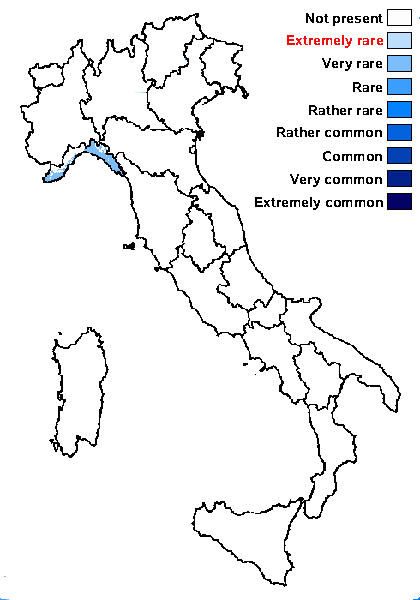Lepra erumpens (Erichsen) Hafellner
in Nimis et al., MycoKeys 31: 10, 2018. Basionym: Pertusaria erumpens Erichsen - Acta Faun. Fl. Univers., Ser. 2, Bot. 1, 17: 1, 1935.
Synonyms:
Distribution: N - Lig.
Description: Thallus crustose, episubstratic, rather thin, finely rimose to irregularly fine- warted, pale to dark grey, sorediate, sometimes delimited by a thin, black prothalline line. Soralia small, 0.2-0.5 mm across, at first punctiform, then small-maculiform and more or less orbicular, often delimited by a raised thalline margin, finally sometimes confluent, moderately convex, yellowish white, with coarsely granular soredia. Apothecia unknown. Photobiont chlorococcoid. Spot tests: cortex K+ yellow, C-, KC+ yellow then brownish yellow, P-, UV-; medulla and soralia K+ yellow-brown, C-, KC+ pale yellow-brown, P+ orange-red. Chemistry: medulla and soralia with fumarprotocetraric acid (major) and variable amounts of protocetraric acid. Note: a very poorly known taxon of siliceous rocks, also reported from Romania and Austria, related to L. aspergilla, reported from Liguria. The indicator values are tentative.
Growth form: Crustose
Substrata: rocks
Photobiont: green algae other than Trentepohlia
Reproductive strategy: mainly asexual, by soredia, or soredia-like structures (e.g. blastidia)
Poorly known taxon in need of further study
Commonnes-rarity: (info)
Alpine belt: absent
Subalpine belt: absent
Oromediterranean belt: absent
Montane belt: absent
Submediterranean belt: absent
Padanian area: absent
Humid submediterranean belt: very rare
Humid mediterranean belt: very rare
Dry mediterranean belt: absent

Predictive model
Herbarium samples
Growth form: Crustose
Substrata: rocks
Photobiont: green algae other than Trentepohlia
Reproductive strategy: mainly asexual, by soredia, or soredia-like structures (e.g. blastidia)
Poorly known taxon in need of further study
Commonnes-rarity: (info)
Alpine belt: absent
Subalpine belt: absent
Oromediterranean belt: absent
Montane belt: absent
Submediterranean belt: absent
Padanian area: absent
Humid submediterranean belt: very rare
Humid mediterranean belt: very rare
Dry mediterranean belt: absent

Predictive model
| Herbarium samples |
 INDEX FUNGORUM
INDEX FUNGORUM
 GBIF
GBIF

